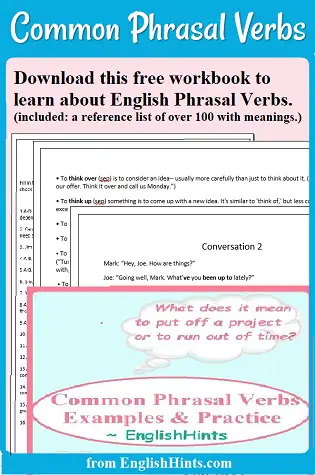Common Phrasal Verbs
Do you want to understand common phrasal verbs better? Do you wonder why English speakers use so many of them when they could use one-word verbs that have the same meaning? Here's a brief explanation and then a free phrasal verb workbook you can download to learn more and keep as a handy reference.
English speakers like phrasal verbs because they seem more conversational than many one-word verbs that often come from Latin.
Phrasal verbs use very basic English verbs like 'come,' 'go,' 'give,' 'get,' or 'look.' They add one or two prepositions (In, out, off, on, for, with, up, to, etc.) to give a meaning that might-- or might NOT-- be directly related to the meaning of the verb itself.
"To go out with someone" is simple: it means to leave your home in the company of someone you want to know better. (It's not in this workbook. I tried to focus on expressions that aren't so obvious.)
Many phrasal verbs have developed meanings that are not at all obvious. The workbook lists just over 100 of the most common phrasal verbs, with their meanings and usually with example sentences.
What's in the Common Phrasal Verbs Workbook?
It starts with four conversations that illustrate how English speakers use some of them. After each conversation is a matching practice so you can connect these expressions with single verbs that mean the same thing.
Then there's a page that explains separable and inseparable phrasal verbs. It's an important grammar point if you want to try using them yourself. It can be complicated, but there is a simple way to avoid using them incorrectly.
The main section of the workbook is an alphabetical reference list giving about 100 phrasal verbs, their meanings and examples of how they are used. Each also identifies 2-word verbs as either separable or inseparable. (All 3-word or more verb phrases are inseparable.)
Finally, there's a simple quiz to practice some of the most common phrasal verbs of all.
Note: If you sign up, you should get an email soon asking you to "confirm your subscription." (This ensures no one else signed you up without your permission.) If you don't see the email, check your spam folder.
When you click "Yes," it should take you to a short page with a link to download your pdf. If you have any questions, please contact me via a link in the blue section at the bottom of this page. I hope you find it helpful!
Home > Common Idioms > Common Phrasal Verbs
Didn't find what you
needed? Explain what you want in the search box below.
(For example, cognates, past tense practice, or 'get along with.') Click to see the related pages on EnglishHints.
| site search by freefind | advanced |


